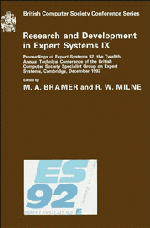Book contents
- Frontmatter
- Contents
- Preface
- Introduction
- CONSULTANT: providing advice for the machine learning toolbox
- A methods model for the integration of KBS and conventional information technology
- KBS methodology as a framework for co-operative working
- Project management for the evolutionary development of expert systems
- The specification and development of rule-based expert systems
- Towards a method for multi-agent system design
- Jigsaw: configuring knowledge acquisition tools
- On the relationship between repertory grid and term subsumption knowledge structures: theory practice tools
- Strategy maze: an on-line tool for support management of the knowledge acquisition process
- Concurrent engineering using collaborating truth maintenance systems
- Ockham's razor as a gardening tool
- A designer's consultant
- Fairness of attribute selection in probabilistic induction
- An application of case-based expert system technology to dynamic job-shop scheduling
- Neural network design via LP
- KEshell2: an intelligent learning data base system
- Approaches to self-explanation and system visibility in the context of application tasks
- An object oriented approach to distributed problem solving
- Intelligent user interface for multiple application systems
- Combining qualitative and quantitative information for temporal reasoning
- Documents as expert systems
Ockham's razor as a gardening tool
Published online by Cambridge University Press: 04 August 2010
- Frontmatter
- Contents
- Preface
- Introduction
- CONSULTANT: providing advice for the machine learning toolbox
- A methods model for the integration of KBS and conventional information technology
- KBS methodology as a framework for co-operative working
- Project management for the evolutionary development of expert systems
- The specification and development of rule-based expert systems
- Towards a method for multi-agent system design
- Jigsaw: configuring knowledge acquisition tools
- On the relationship between repertory grid and term subsumption knowledge structures: theory practice tools
- Strategy maze: an on-line tool for support management of the knowledge acquisition process
- Concurrent engineering using collaborating truth maintenance systems
- Ockham's razor as a gardening tool
- A designer's consultant
- Fairness of attribute selection in probabilistic induction
- An application of case-based expert system technology to dynamic job-shop scheduling
- Neural network design via LP
- KEshell2: an intelligent learning data base system
- Approaches to self-explanation and system visibility in the context of application tasks
- An object oriented approach to distributed problem solving
- Intelligent user interface for multiple application systems
- Combining qualitative and quantitative information for temporal reasoning
- Documents as expert systems
Summary
“Pruning is done to prevent over crowding, for the health of the plant, to open up the lower branches to the light and to create space.” – Ashley Stephenson, The Garden Planner (1981).
Abstract: Discrimination or Classification Trees are a popular form of knowledge representation, and have even been used as the basis for expert systems. One reason for their popularity is that efficient algorithms exist for inducing such trees automatically from sample data (Brieman et al., 1984; Quinlan, 1986). However, it is widely recognized among machine-learning researchers that trees derived from noisy or inconclusive data sets tend to be over-complex. This unnecessary complexity renders them hard to interpret and typically degrades their performance on unseen test cases. The present paper introduces a measure of tree quality, and an associated tree pruning technique, based on the minimum-message-length (MML) criterion (Wallace & Freeman, 1987; Wolff, 1991). Empirical trials with a variety of data sets indicate that it achieves greater than 80% reduction in tree size, coupled with a slight improvement in accuracy in classifying unseen test cases, thus comparing favourably with alternative simplification strategies. Moreover, it is simpler that previously published pruning techniques, even those based on the MML principle such as that of Quinlan & Rivest (1989).
Keywords: Machine Learning, Data Compression, Inductive Inference, Information Theory, Entropy Minimax, Classification Algorithms, Discrimination Trees.
INTRODUCTION
One reason for the popularity of discrimination trees (also known as decision trees) for representing knowledge is that they are relatively easy to understand.
- Type
- Chapter
- Information
- Research and Development in Expert Systems IX , pp. 183 - 196Publisher: Cambridge University PressPrint publication year: 1993



